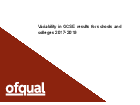Variability in #GCSE results for schools and colleges 2017-2019

Analysis of how GCSE results for schools and colleges have changed in recent years.
Documents
Variability in GCSE results for schools and colleges 2017-2019
Ref: Ofqual/19/6534PDF, 1.81MB, 17 pages
This file may not be suitable for users of assistive technology. Request an accessible format.
If you use assistive technology (such as a screen reader) and need aversion of this document in a more accessible format, please email [email protected].Please tell us what format you need. It will help us if you say what assistive technology you use.
Details
Key points
- In general, the level of variation in individual school and college results at grades 9 to 4 or A* to C is slightly less than in previous years
- Differences between the average (mean) percentage of students achieving grades 9 to 4 or A* to C 2018/2019 and in 2017/2018 are generally small, indicating that year-on-year results in the subjects analysed have remained relatively stable
- Even when there are no changes to qualifications, individual schools and colleges will see variation in their year-on-year results: this is normal
GCSE results in England have been relatively stable in recent years, with only very small changes in the overall percentages of students achieving grades 9 to 4 or A* to C. However, we know that individual schools and colleges will always see variation in the proportion of students achieving particular grades from one year to the next. This can be due to many different factors, including differences in the ability mix of the students, different teaching approaches, changes in teaching staff or teaching time, and changes to qualifications.
This summer, new GCSE qualifications in 25 subjects were awarded in England for the first time. This brings the total number of reformed GCSEs to 48. We have analysed the year-on-year variation in the percentage of students achieving grades 9 to 4 or A* to C in 12 of the larger entry reformed subjects. For English language and maths, the 2017 data includes students sitting the reformed 9 to 1 qualifications and students sitting the legacy A* to C qualifications.
The evidence suggests that the variation at school/college level is generally slightly less than in previous years. For English language, English literature and maths we have looked at schools and colleges with 50 or more students in both years. For other subjects, we have looked at schools and colleges with 25 or more students in both years. We have also looked at the variation in English language, English literature, maths and combined science for students in year 11 only (16-year-old students)











Responses